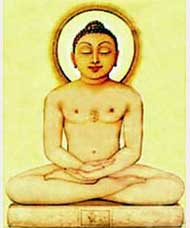Jainism
Vardhamana Mahavira was the 24th Tirthankara of the Jain tradition. He was born at Kundagrama near Vaisali to Kshatriya parents Siddhartha and Trisala. He married Yasoda and gave birth to a daughter. At the age of thirty he became an ascetic and wandered for twelve years. In the 13th year of his penance, he attained the highest spiritual knowledge called Kevala Gnana. Thereafter, he was called Mahavira and Jina. His followers were called Jains and his religion Jainism. He preached his doctrines for 30 years and died at the age of 72 at Pava near Rajagriha.
 |
| Vardhamana Mahavira |
Teachings of Mahavira The three principles of Jainism, also known as Triratnas (three gems), are:
- right faith
- right knowledge
- right conduct
Right faith is the belief in the teachings and wisdom of Mahavira. Right Knowledge is the acceptance of the theory that there is no God and that the world has been existing without a creator and that all objects possess a soul. Right conduct refers to the observance of the five great vows :
- not to injure life
- not to lie
- not to steal
- not to acquire property
- not to lead immoral life.
Both the clergy and laymen had to strictly follow the doctrine of ahimsa. Mahavira regarded all objects, both animate and inanimate, have souls and various degrees of consciousness. They possess life and feel pain when they are injured. Mahavira rejected the authority of the Vedas and objected to the Vedic rituals. He advocated a very holy and ethical code of life. Even the practice of agriculture was considered sinful as it causes injury to the earth, worms and animals. Similarly the doctrine of asceticism and renunciation was also carried to extreme lengths by the practice of starvation, nudity and other forms of self-torture.
Information related to the search:
Jainism, mahavira, india, jainism, right, life, history, knowledge, called, vardhamana, possess, doctrine, practice, objects, faith, teachings, three, years, conduct

